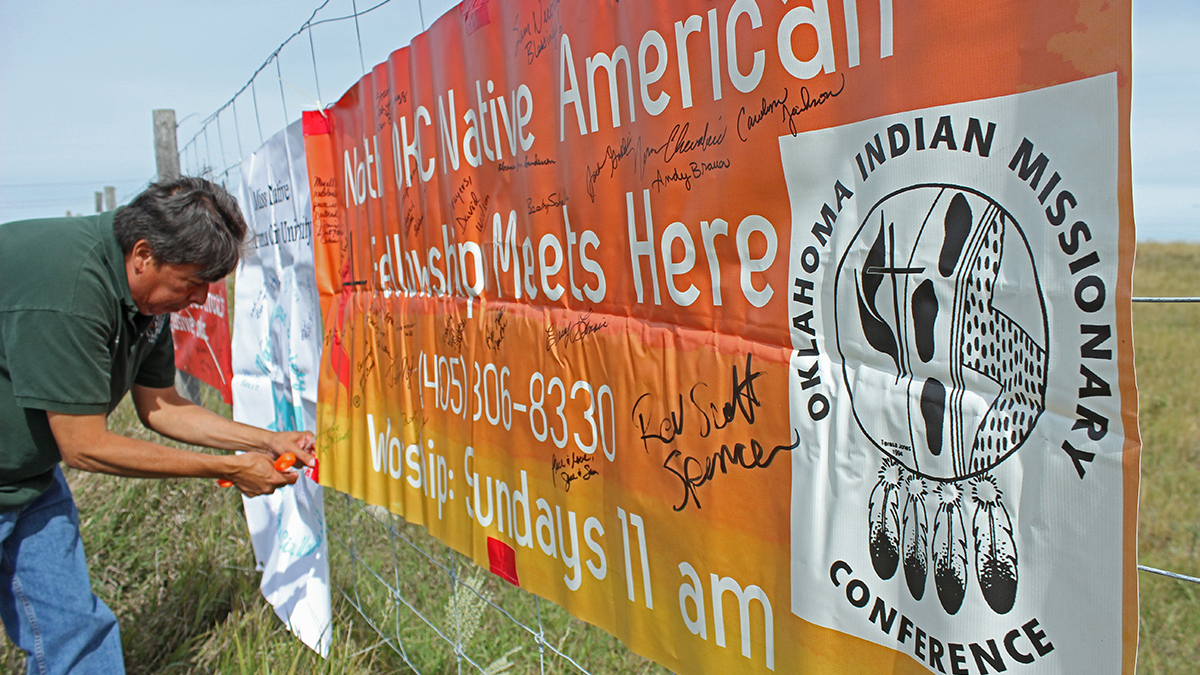
Leaders of the Eastern PA Conference Committee on Native American Ministries (CONAM) commented on three recent historic decisions favorable to Native American justice concerns.
A promising trend of racial justice-related actions was ignited this summer by widespread protest against police killings of unarmed African American citizens—most notably George Floyd in Minneapolis, Minn., May 25. That trend may include a trio of recent victories for Native Americans rights and dignity.
NFL team name change victory for Native people
The owner of the National Football League’s Washington DC professional team changed his firm stance against changing the team’s historic name, the Redskins, after decades of protests and demands by Native peoples and many other advocates. The name has long been considered disrespectful by many, while defenders have dubiously contended that it honors Native Americans.
Now, economic pressure by several key corporate sponsors—including FedEx, which owns the team’s stadium—has forced owner Dan Snyder to agree to change the name and logo that depicts a Native warrior’s head. A decision on a new name is forthcoming. Read UM News’ coverage and comments about the decision:
United Methodist advocates say dropping Redskins as Washington’s NFL team’s name marks the beginning of an era of understanding the negative impact the names have for Native people. Read story
Native Americans joyful about SCOTUS decision
Meanwhile, two court decisions are also being celebrated by Native peoples and justice advocates. The U.S. Supreme Court has ruled, in a historic decision, to favor tribal jurisdiction over law enforcement and prosecution on tribal lands. Read more in UM News’ coverage:
Native Americans, including United Methodists, are hailing a U.S. Supreme Court ruling on tribal jurisdiction as a decision that will be written about in history books and celebrated in museums. Read story
Court ruling temporarily halts Dakota pipeline
And finally, a district court ruling this month gives a boost to continuing efforts by the Standing Rock Sioux Tribe and others to stop operation of the Dakota Access oil pipeline. Four years after nationally popular protests against the completion of the pipeline, amid fears of water contamination and desecration of Native burial lands, the court demanded that the pipeline be shut down by August 5, while an in-depth environmental review is conducted. Read UM News’ coverage:
A new court ruling gives a boost to continuing efforts by the Standing Rock Sioux Tribe and others to stop the Dakota Access Pipeline, say United Methodist supporters. Read story
Comments by Eastern PA CONAM leaders
“This is an incredible time in Indian Country that has given us all good reason to celebrate,” said Sandra Cianciulli, CONAM co-chairwoman. “Each win was the result of much blood, sweat and years of commitment by:
- the leadership of the Muscogee Creek Nation;
- the persistence of several activists who risked life and career to keep the pressure on the Washington DC NFL team; and
- a literal battle with oil barons backed by the President of the United States, to retain a treaty right of tribal consultation for oil exploration and transport on Indian land.”
“In this moment of a seismic shift towards racial justice for all, I’m so glad Indian people are not being forgotten,” said Cianciulli, a Lakota. “Maybe now, people will learn we are still here, and they need to put away the old 19th Century stereotype image of the fringed and feathered friend, and allow us to be who we are: the products of a living culture that still exists.”
“The recent news about Native-themed mascots is cause for celebration,” said Verna Colliver, CONAM secretary. “As allies we need to celebrate this and other successes, such as the recent Supreme Court ruling in Oklahoma and the suspension of the Dakota Access pipeline pending further review. However, we cannot rest on these victories. We cannot stop our efforts to protect the rights of Native Americans because the federal government and corporations continue to permit drilling for oil and gas and to extract minerals from reservation land.”
